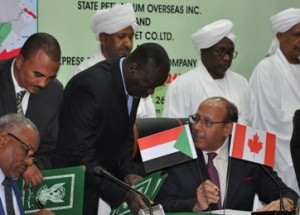
A representative from the State Oil Company Canada Ltd signs the exploration and production sharing agreement in Khartoum on Sunday, while vice-president Hasabo Abdel Rahma and investment minister Mustafa Osman Ismail look on (Photo courtesy of the ministry of petroleum)
Khartoum, Sudan | – Sudan’s oil ministry signed oil exploration contracts with three companies on Sunday, including the State Oil Company Canada Ltd and Nigeria’s Express Petroleum & Gas Ltd, to work in Al-Rawat.
The big Blok 26 or Al-Rawat field is mainly located in White Nile state but other parties are in Sennar and North Kordofan states. The oilfield is located near the pipeline which links Adarail oilfield in South Sudan to Port Sudan.
The exploration activities in this block include oil and gas. It is part of government’s efforts to increase the country’s daily production to 200.000 barrels.
The signing ceremony of exploration and production sharing agreement which took place at the oil ministry, was attended by Sudanese vice president Hasabo Abdel Rahman and investment minister Mustafa Osman Ismail.
The oil minister Makkawi Mohamed Awad signed the agreement on behalf of the Sudanese government while the State and the Express were represented by their directors according to a statement by the oil ministry release after the signing on Sunday.
The State which is owned by Lutfur Rahman Khan holds 50% of the shares while the Nigerian gas company has 20%, the remaining 30% of the consortium are held by the government owned Sudapet.
Khan was the chairman of Arakis Energy Corporation which was working in Heglig oil fields before to sell its shares in March 2003 to India’s National Oil Company under the pressure of the Canadian government which had been lobbied by rights groups.
Sudan lost 75% of its oil reserves after the southern part of the country became an independent nation in July 2011, denying the north billions of dollars in revenues. Oil revenue constituted more than half of the Sudan’s revenue and 90% of its exports.
The East African country currently produces 133,000 barrels of oil per day (bpd). The country’s production is stationed mainly in the Heglig area and its surroundings, as well as western Kordofan.
Following South Sudan’s secession, several foreign companies started exploration in new oil fields.
A Saudi company is currently working in Block 12, located in Sudan’s north-western corner near the borders with Libya, while a Canadian company shares exploration with the Sudanese company Sudapet in Block 14.
Sudan Energia is working in Block 18 which is located to the west of the river Nile. Block 11 is located in Kordofan, while Block 9 is located in the Gezira, Khartoum, and River Nile states.
Blocks 13 and 14 are on the Red Sea coast, while Blocks 19, 22, 21 are inside the Red Sea. Block 10 is located between Kassala and Al-Gedaref states in eastern Sudan, and Block 8 is located in Sennar state.


